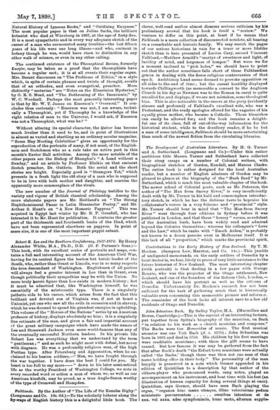Falklands. By the Author of "The Life of Sir Kenelm
Digby." (Longmans and Co. 10a. 6d.)—To the scholarly loiterer along the by-ways of English history this is a delightful little book. The clever, well-read author almost disarms serious criticism by his preliminary avowal that his book is itself a "review." We venture to differ on this point, at least if he means that Falklands is a mere collection of disconnected notelets, all bearing on a remarkable and historic family. We may search the pages of our serious historians in vain for a truer or more lifelike sketch than is here presented of Lucius Cary, second Viscount Falkland,—Matthew Arnold's "martyr of sweetness and light, of lucidity of mind, and largeness of temper." But wore we for a moment inclined to "pick holes," we should have to point out that the author sometimes falls short of these Falklandian graces in dealing with the fierce religious controversies of that epo:h. Archbishop Laud seems doomed to provoke opposition on all sides to the end of time ; but the casual hostility displayed towards Chillingworth (as memorable a convert to the Anglican Church in his day as Newman was to the Roman in ours) is quite uncalled for, and displays, if we are not mistaken, some theological bias. This is also noticeable in the sneers at the piety (evidently sincere and profound) of Falkland's excellent wife, who was a Protestant, and the ready apologies offered for the vagaries of his equally pious mother, who became a Catholic. These blemishes can easily be allowed for g and the book remains a delight- ful one of its class, full of out-of-the-way information for the historical student, while to the desultory reader, if he be but a man of some intelligence, Falklands should be more entertaining than much of the newest fiction from the circulating libraries.






































 Previous page
Previous page